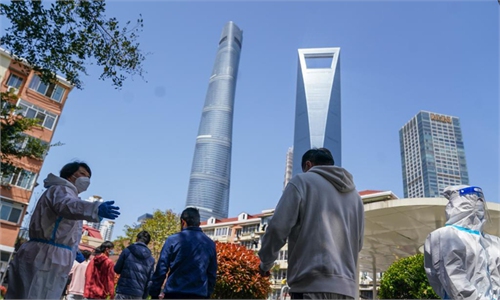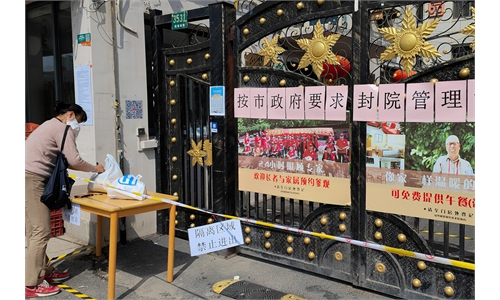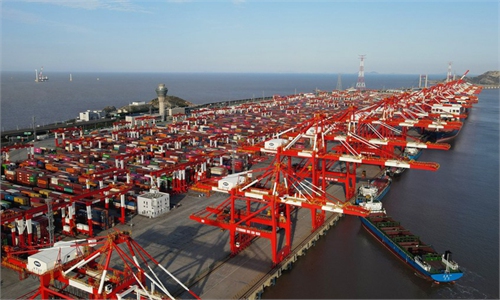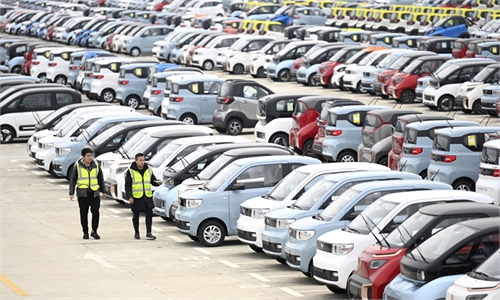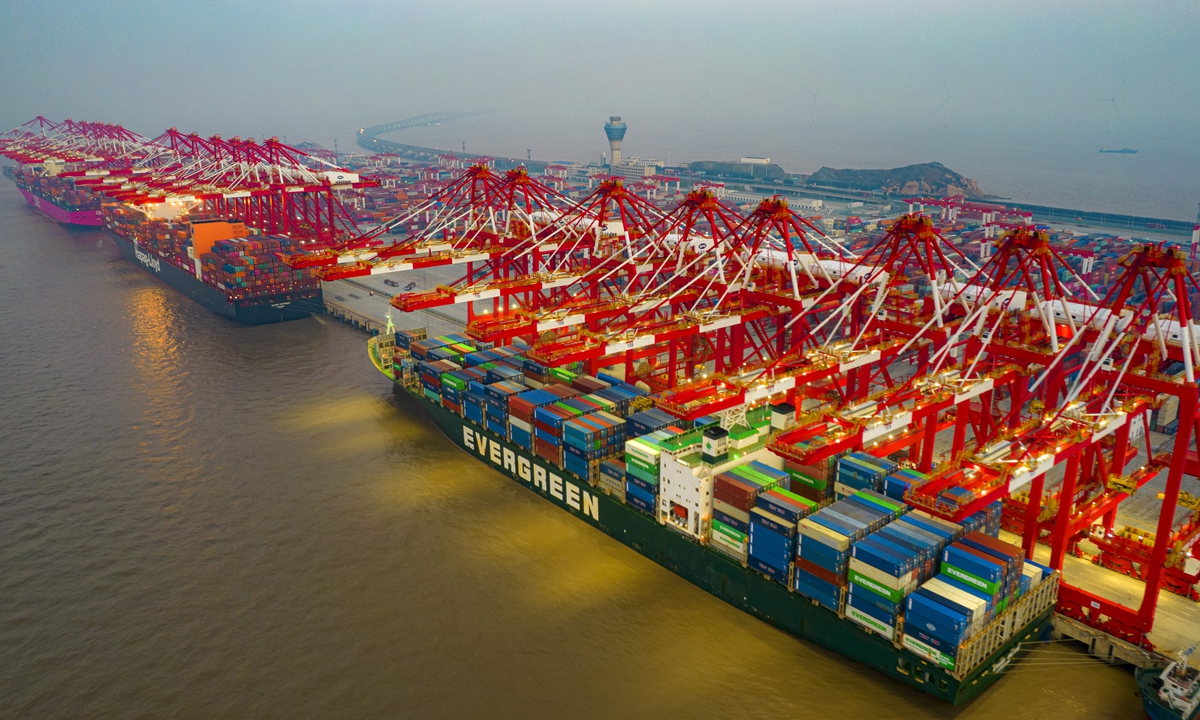
Container vessels berth at the Port of Yangshan to clear cargo around the clock in Shanghai on January 2, 2022. In 2021, the Port of Shanghai handled over 47 million standard containers, ranking first among the world's ports for the 12th consecutive year. Photo: VCG
The raging COVID-19 pandemic and Russia-Ukraine conflict have added more uncertainties to the prospects of world economic recovery. Kristalina Georgieva, the IMF's managing director, said on Thursday that the IMF would cut its economic growth forecasts for 143 economies around the world. It is supposed to be a matter of the whole world, but some Western media attributed the hindered economic recovery and the bottlenecks in the global supply chains to the insistence on "dynamic zero" policy by several industrial centers in China, brushing the political manipulation they have carried out since the outbreak of the pandemic with new paint.
Over the past two years, China has been the most resolute country in adhering to scientific precision and dynamic zero-COVID. It has done the best job in protecting people's lives and health, and made the greatest contribution to ensuring global economic recovery and smooth supply chains. As the pandemic raged around the world, China took the lead in stabilizing the epidemic, resuming work and production, and achieving low mortality and minimal disruptions in the economy. The first quarter of this year saw the country's total trade expand more than 10 percent year-on-year. China's foreign trade posted positive year-on-year growth for seven consecutive quarters. From Apple mobile phones to Tesla electric cars, "Made in China" continues to supply blood to the major arteries of the global industrial chain, bringing certainty to the world disturbed by "Black Swan" and "Grey Rhino" events. Bloomberg in February published an article entitled "Why the World Needs China's Covid-Zero Policy," saying the policy has benefited the whole world. Now, the excessive attention that some Western media outlets are paying to China's epidemic prevention policy only proves the weight of China in the global industrial chain.
It should also be noted that the impact of the temporary "pause" in Shanghai and other Chinese cities has been deliberately exaggerated by the West. First, the sealing-off is only temporary. It is a temporary measure to better resume work and production and to make the economy and society function more effectively. Its effectiveness has been proven.
Second, China has a population of 1.4 billion. Among them are 267 million people aged 60 and above, and more than 50 million elderly people have not completed a full course of vaccination. If we don't prevent the epidemic, but focus on treating those infected and let a large number of elderly patients and patients with underlying medical conditions die "naturally," this is not morally acceptable to Chinese society, and will also bring far-reaching economic chaos. Countries such as the US and the UK are still facing warnings of "recession" after putting aside people's lives.
It is the geopolitical risk combined with the COVID-19 pandemic that constitutes the biggest disturbance to world economic recovery, rather than scientific and precise anti-epidemic measures. Why does the global high-tech industry lack chips, and why are the prices of energy and food soaring? Some people should know better than anyone else. In 2018, the Trump administration launched a trade war against many countries in the world, including China, which has shaken the global industrial chain, and the consequences are still fermenting to this day.
After the outbreak of the pandemic, the Federal Reserve continued to print more money and took advantage of the hegemony of the US dollar to make a profit, leading the global economy to the risk of stagflation or even recession. Since the conflict between Russia and Ukraine started, the US and the West have imposed maximum sanctions on Russia, a major energy and food producer, and coerced countries that maintain normal trade with Russia. This has seriously disrupted the international monetary, financial and trade order.
The US and the West have stirred up many global economic storms in the past years, but few Western media outlets seriously criticized them. China has contributed a lot to the stable recovery of the global economy, but is being accused of hitting global trade simply only because several cities' economies are temporarily affected by the epidemic. This is unjustifiable.
Fighting the epidemic and developing the economy have never been an either-or choice for China, but a must-answer question of overall planning for both. Even when many residential areas were sealed off in Shanghai, the port of Shanghai has still been operating 24/7 through measures such as establishing a "closed loop" bubble in different districts, and there was no such thing as a complete "lockdown" as some Western media called it. The Chinese government is also working hard to take various measures to help companies get through the obstacles in terms of transportation and ensure the production and people's livelihood to the greatest extent. Behind the general principle of "striving to achieve the greatest prevention and control effect at the least cost, and minimizing the impact of the epidemic on economic and social development," as well as the dynamic zero-COVID policy, is the country's significance attached to the economy and people's livelihood. After the success in controlling the epidemic, people could see easy activities of production and operations.
Jilin is an important center of China's auto industry. After realizing zero-COVID among communities in its epidemic prevention and control, it is promoting the simultaneous resumption of work and production for enterprises of all sizes in both the upstream and downstream of the industrial chain. We also firmly believe that Shanghai, which is sure to get rid of the epidemic, will definitely regain the time lost in the epidemic. The epidemic will eventually pass, and China's economy will achieve healthier development and contribute more to the recovery of the world economy. Persistence will bring China victory.
